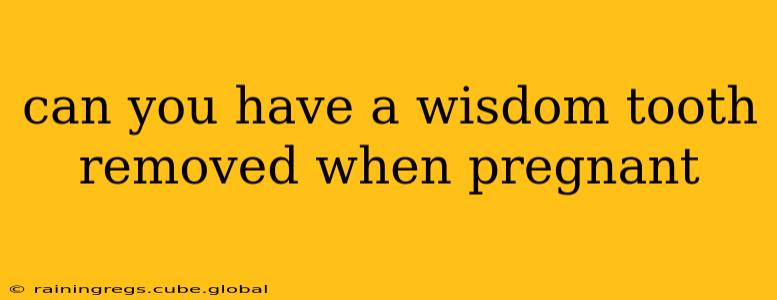Can You Have a Wisdom Tooth Removed When Pregnant?
The short answer is: it depends. While it's generally recommended to postpone elective dental procedures during pregnancy, the removal of a wisdom tooth is not always elective. The decision to remove a wisdom tooth during pregnancy hinges on several factors, primarily the urgency of the situation and the potential risks versus benefits. Let's delve deeper into the considerations.
What are the risks of wisdom tooth removal during pregnancy?
This is a crucial question many expectant mothers ask. The primary concerns revolve around:
- Infection: The risk of infection following any dental procedure exists, and during pregnancy, infections can be more serious. A compromised immune system and the potential impact on the developing fetus necessitate extra caution. However, modern dental practices employ rigorous sterilization techniques significantly mitigating this risk.
- Medication: Certain medications used for pain relief and infection control during and after the procedure might pose risks to the developing fetus. Your dentist will carefully consider the safest options, often opting for less potent painkillers or antibiotics with known safe pregnancy profiles.
- Stress and Anesthesia: The stress of the procedure itself and the use of anesthesia can theoretically affect the pregnancy, though evidence supporting significant harm is limited. A thorough consultation with your dentist and obstetrician is crucial to weigh these potential risks.
- Radiation: While dental X-rays utilize low levels of radiation, some dentists prefer to avoid them during pregnancy unless absolutely necessary. Digital X-rays, which use significantly lower radiation, are generally preferred if imaging is required.
When is wisdom tooth removal necessary during pregnancy?
Despite the potential risks, sometimes removing a wisdom tooth during pregnancy is unavoidable due to:
- Severe pain and infection: Untreated infections can spread, potentially leading to serious complications for both the mother and the fetus. Severe pain can also impact the mother's overall well-being and sleep, which is crucial for a healthy pregnancy.
- Impacted wisdom teeth causing damage: Impacted wisdom teeth can damage adjacent teeth, leading to further complications. Addressing this issue promptly is important to preserve oral health.
- Cysts or tumors: The presence of cysts or tumors associated with wisdom teeth necessitates prompt removal to prevent further growth and potential complications.
What trimester is safest for wisdom tooth removal during pregnancy?
Ideally, wisdom tooth removal should be avoided during the first trimester, when the fetus is most vulnerable to the effects of medication and stress. The second trimester is generally considered the safest time for any elective or necessary dental procedure, as the risk of miscarriage is lower, and organ development is more advanced. However, every case is unique, and your dentist and obstetrician should collaborate to determine the best course of action based on your individual circumstances.
What should I discuss with my dentist and obstetrician?
Open communication is key. Discuss all your concerns and medical history with both your dentist and your obstetrician. They will work together to determine the best timing and approach for your specific situation, weighing the risks and benefits meticulously. Don't hesitate to ask questions about the type of anesthesia used, the potential side effects of medications, and the post-operative care plan.
Can I avoid wisdom tooth removal during pregnancy?
In some cases, postponing the removal until after delivery may be the safest option. However, this should be decided in consultation with your healthcare providers, considering the potential consequences of delaying treatment. Careful monitoring of the impacted tooth's condition is crucial to ensure no complications arise before the planned removal after pregnancy.
Ultimately, the decision of whether or not to have a wisdom tooth removed during pregnancy is a personalized one that requires close collaboration between your dentist and your obstetrician. They will consider your individual circumstances and help you make the most informed decision for the health of both you and your baby. Remember, proactive communication is crucial to ensuring a safe and positive outcome.
